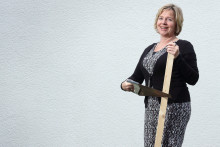Minister of the Interior and Kingdom Relations Ronald Plasterk called her work ‘impressively complex’. Judith Bakker, PhD candidate in public administration, felt understood: ‘Plasterk visited our chair and noticed that my research involves numerous concepts. He recognized how difficult it is to measure them scientifically. This was nice to hear.’
Judith studies citizens’ initiatives in neighbourhoods. Specifically, she looks at the relations of those initiatives with democratic aspects and the governmental organisations. Why those two topics? ‘Stepping up for the greater good in your near surroundings is a political process. Those who take initiative have a certain amount of control’, Judith explains. ‘And sooner or later, you’ll have to collaborate with local governments to realise your projects.’
Sense of community
The PhD candidate does not take a general position on whether civil initiatives are good or bad. ‘Local initiatives can increase the quality and sense of community in a neighbourhood. It can also help grow competencies of those who take action. But just because something is started by civilians, doesn’t mean it’s automatically useful or great.’
After her PhD is completed, Judith sees herself working for the government. In an advisory role, perhaps. Judith advocates that bureaucratic obstacles should be removed, motivators should be enforced, and that the government should leave the rest up to the people: ‘Don’t charge high permit fees, implement vouchers for activities you want to promote and be flexible if need be.’
Healthcare change
One of the topics that municipalities might need advise on, is the upcoming change in the Dutch healthcare system. Local governments will become responsible for a large proportion of long-term care for their residents. Can healthcare be provided by neighbours? Judith argues that this combination is tricky: ‘Healthcare is frequently intimate. People are usually willing to lend a hand, but they aren’t so much willing to receive. Patients don’t want their neighbours to assist in daily care. Only family and professionals are allowed to do that.’
Judith has been around the block. Before starting her PhD, she had been working on the topic in different settings since the early 90’s. She saw citizens helping asylum seekers, taking care of the liveability in their streets and organising activities for the elderly. Judith reassures that during these years, human nature hasn’t change much: ‘People do an awful lot for others. We haven’t become less social at all.’







